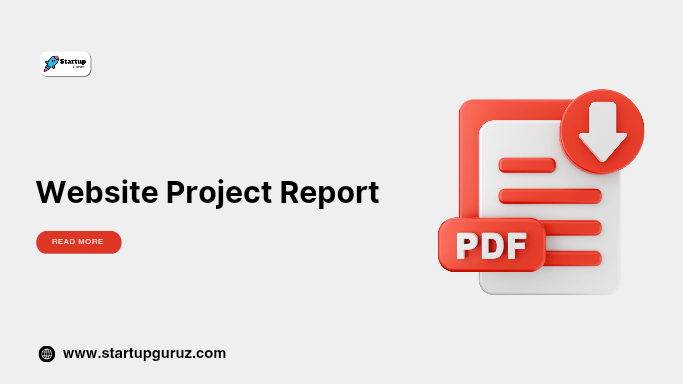Website Project Report
Website Project Report – A Complete Guide for Development & Planning
Introduction
In the digital era, a website is essential for businesses, organizations, and individuals to establish an online presence. A Website Project Report outlines the objectives, scope, budget, technical requirements, and expected outcomes of a website development project.
This report helps business owners, developers, and investors understand the feasibility, cost analysis, and implementation strategies of the website. Whether you are applying for a loan, seeking investors, or planning a structured website development process, this detailed project report will guide you.

Why Do You Need a Website Project Report?
A well-structured project report ensures:
✔ Clarity in Website Goals – Defines the purpose, features, and functionalities of the website.
✔ Better Budget Management – Helps in estimating development, hosting, and maintenance costs.
✔ Efficient Resource Allocation – Determines human resources, software, and tools required.
✔ Time & Task Management – Sets timelines for development, testing, and launch.
✔ Loan & Investment Approval – Required for funding, business expansion, or IT project financing.
A website project report is beneficial for startups, eCommerce businesses, corporate websites, and government portals.
Types of Websites Covered in a Project Report
1. Business Website
For companies looking to establish an online presence, attract customers, and generate leads.
2. eCommerce Website
For online shopping platforms with payment gateways, product listings, and customer management.
3. Portfolio Website
Showcases personal or professional work for freelancers, designers, photographers, and artists.
4. Educational Website
E-learning platforms, university portals, and online course management systems.
5. Blogging Website
For content creators who want to share knowledge, monetize content, and engage audiences.
6. Government & NGO Websites
For public information dissemination, project tracking, and policy updates.
7. Web Applications
Custom-built applications with user dashboards, API integration, and automated workflows.
Key Components of a Website Project Report
1. Project Overview
✔ Purpose of the Website
✔ Target Audience & Market Analysis
✔ Competitor Research & Industry Trends
2. Technical Requirements
✔ Domain Name & Hosting Selection
✔ Technology Stack (HTML, CSS, JavaScript, PHP, Python, WordPress, etc.)
✔ Database & Content Management System (CMS)
✔ Security & Data Protection Measures
3. Website Design & Development Plan
✔ Wireframes & UI/UX Design
✔ Frontend & Backend Development
✔ Mobile & Desktop Compatibility
4. Features & Functionalities
✔ Navigation & User Experience
✔ SEO & Performance Optimization
✔ E-commerce Integration (if applicable)
✔ Content Strategy & Management
5. Budget & Financial Planning
✔ Development Costs (Software, Hardware, & Tools)
✔ Domain & Hosting Fees
✔ Marketing & SEO Expenses
✔ Maintenance & Support Costs
6. Project Timeline & Milestones
✔ Phase 1 – Requirement Gathering & Planning
✔ Phase 2 – Design & Development
✔ Phase 3 – Testing & Debugging
✔ Phase 4 – Launch & Post-Launch Maintenance
7. Revenue Model (if applicable)
✔ Ad Revenue & Affiliate Marketing
✔ Subscription-based Model
✔ E-commerce Sales & Digital Products
8. Risk Assessment & Contingency Plan
✔ Security Threats & Cyberattacks
✔ Technical Failures & Backup Solutions
✔ Regulatory & Compliance Risks
9. Funding & Loan Requirements
✔ Bank Loan for IT Projects
✔ Government Schemes for Startups & Digital Initiatives
✔ Investor Funding for Tech-Based Businesses
Investment & Cost Estimation for Website Development
1. Domain & Hosting Costs
✔ Domain Registration: ₹1,000 – ₹5,000/year
✔ Web Hosting (Shared/VPS/Dedicated): ₹3,000 – ₹50,000/year
2. Web Development Costs
✔ Basic Website: ₹10,000 – ₹50,000
✔ E-commerce Website: ₹50,000 – ₹5,00,000
✔ Custom Web Application: ₹1,00,000 – ₹10,00,000+
3. Maintenance & Marketing Costs
✔ Website Maintenance: ₹5,000 – ₹50,000/year
✔ SEO & Digital Marketing: ₹10,000 – ₹1,00,000/month
4. Total Estimated Investment
✔ Small Website: ₹20,000 – ₹1,00,000
✔ Medium Business Website: ₹1,00,000 – ₹5,00,000
✔ Large Enterprise Website: ₹5,00,000+
Revenue & Profitability Analysis
✔ Ad Revenue (Google Ads, Affiliate Marketing)
✔ Subscription-Based Business Models
✔ Online Sales for eCommerce Websites
✔ Consulting & Lead Generation for Service-Based Businesses
Estimated ROI: 50% – 200% per annum (depending on traffic and monetization strategies).
FAQs on Website Project Report
1. What is a Website Project Report?
A document outlining the objectives, development plan, budget, and feasibility analysis of a website project.
2. Why is a project report required for website development?
It helps in planning, cost estimation, securing loans, and attracting investors for online business models.
3. What are the key components of a website project report?
It includes project scope, technical requirements, financial planning, risk assessment, and marketing strategy.
4. How much does it cost to build a website?
Costs range from ₹20,000 for a basic site to ₹10,00,000+ for advanced web applications.
5. What technologies are used in website development?
Popular technologies include HTML, CSS, JavaScript, WordPress, Python, PHP, and Laravel.
6. Can I get a bank loan for website development?
Yes, banks, NBFCs, and government startup schemes provide loans for IT-based businesses.
7. How long does it take to develop a website?
A basic website takes 1-2 weeks, while an eCommerce site or web application may take 2-6 months.
8. What is the ROI of a website business?
ROI varies, but successful eCommerce and digital businesses can achieve 50-200% annual profits.
9. What are the risks in website development?
✔ Cybersecurity threats
✔ Technical failures & downtime
✔ Lack of traffic & poor marketing strategies
10. How can I monetize my website?
You can earn through ads, affiliate marketing, eCommerce sales, paid memberships, and lead generation.
Conclusion
A Website Project Report is crucial for anyone looking to develop a business website, eCommerce platform, portfolio site, or web application. It helps in planning, budgeting, risk assessment, and securing funding.
By following a structured project report, businesses can build a successful website that generates traffic, revenue, and brand recognition in the digital space.